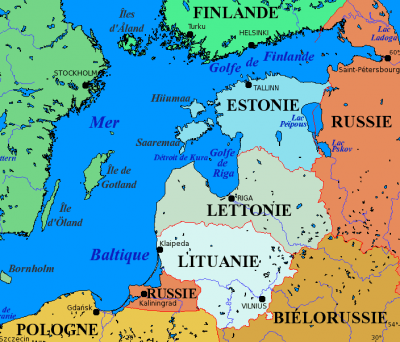Le 14 juin 2013, le Commissaire européen chargé du commerce recevait du Conseil des ministres européen le mandat de négocier avec les États-Unis un traité de commerce dont l’appellation officielle marque l’ambition : Partenariat transatlantique pour le commerce et l’investissement (PTCI, en anglais TTIP). Le traité est plus connu sous le sigle TAFTA (Transatlantic Free Trade Area, Traité de libre-échange transatlantique), généralement utilisé par le mouvement social, qui le nomme également « Grand marché transatlantique ».
Un large mandat
D’emblée, l’objectif est posé par le point 3 du mandat : « L’accord prévoit la libéralisation réciproque du commerce des biens et services ainsi que des règles sur les questions liées au commerce, avec un haut niveau d’ambition d’aller au-delà des engagements actuels de l’OMC. » Il s’agit de négocier ce qu’on appelle dans le jargon un accord « OMC plus », c’est-à-dire un accord prenant pour base les principes qui se trouvent dans les accords de l’Organisation mondiale du commerce (OMC) pour aller plus loin et plus profondément dans la libéralisation du commerce.
Le mot « libéralisation » désigne, depuis presque vingt ans que l’OMC a été mise en place (janvier 1995), la mise en concurrence de tous les opérateurs de commerce internationaux. Cette mise en concurrence passe par la possibilité pour les entreprises d’avoir « accès aux marchés » (étrangers), de réaliser une « présence commerciale » (droit d’installation à l’étranger), de bénéficier au moins de la « clause de la nation la plus favorisée » (un traitement non moins favorable que celui dont bénéficie une autre entreprise étrangère) et, à terme, du « traitement national » (traitement identique de toutes les entreprises quelle que soit leur provenance), sans se voir opposer des « mesures distorsives » au commerce que constituent les décisions publiques de toute nature qui amènent à fausser la concurrence.
C’est le cas des subventions et plus largement des « obstacles au commerce », ou encore des « obstacles techniques au commerce ». Il s’agit généralement de toutes les mesures intérieures jugées « disproportionnées au but poursuivi », « inéquitables » et sans justification économique, sachant que protéger son marché intérieur n’est pas une justification économique par définition.
De la sorte, les gouvernements ou les instances infra-étatiques ne peuvent plus opposer aux entreprises des décisions publiques qui, au prétexte de protéger les populations de certains risques sanitaires, environnementaux ou autres (« obstacles techniques au commerce »), au prétexte de régulation économique, voire d’intervention économique (« obstacles au commerce ») constituent autant de mesures faussant la concurrence. Le point 23 du mandat reprend la nécessité de la clause de la nation la plus favorisée, du traitement national, de l’interdiction des obstacles au commerce qui sont la base des accords de l’OMC.
Mais cet accord entend aller plus loin.
Il aurait pour conséquence de renforcer les droits de la propriété intellectuelle. Dans le contexte de mondialisation actuelle, il s’agit là d’une tendance de fond qui s’approfondit depuis les années 1990 et qui peut avoir pour cadre l’OMC mais aussi, et d’abord, les législations nationales, particulièrement celle des États-Unis qui tend à exporter ses modèles de régulation dans le monde.
Concernant le projet TAFTA, certaines incertitudes planent sur la question de la protection de la propriété intellectuelle et notamment sur celle de la durée durant laquelle l’auteur pourrait prétendre à l’exploitation exclusive de son œuvre. Vu l’opacité des négociations, il est impossible de savoir si les dispositions du type de celles qui étaient présentes dans l’ACTA ne seraient pas présentes. On se souvient que les mécanismes de sanctions à l’encontre des utilisateurs d’Internet avaient déclenché une vive opposition des mouvements sociaux et finalement le rejet du Parlement européen. Il se trouve que la version fuitée de l’Accord économique commercial global (AECG), accord en voie de finalisation entre le Canada et l’Union européenne, porte les mêmes dispositions que le TAFTA et qu’on y trouve ce qui se trouvait dans l’ACTA.
Par ailleurs, le gouvernement français manque rarement de rappeler qu’il a réussi à imposer l’exclusion d’un secteur sensible des négociations : la culture. En fait d’exception culturelle, il s’agit uniquement de l’audiovisuel. Les autres aspects de la culture (livre, spectacle vivant, musique, etc.) ne sont pas concernés. Au demeurant, le Commissaire européen au commerce extérieur a rappelé qu’il ne manquerait pas de demander sur ce point l’élargissement du mandat, selon l’évolution des négociations – comprenez s’il est utile de pouvoir négocier la libéralisation de la culture pour obtenir autre chose. Jusqu’ici, le gouvernement affirme une position inébranlable. Mais, dans le secret de quelques réunions de la Direction générale du commerce, qui se tiennent sans publicité, sans ordre du jour ni compte rendu diffusés, il peut se passer bien des revirements.
Cet accord comporte également deux mécanismes qui, à eux seuls, constituent une des attaques les plus lourdes contre les principes démocratiques fondamentaux jamais tentées à ce jour : le mécanisme de règlement des différends investisseur-État ; le mécanisme de coopération réglementaire.
Deux mécanismes particulièrement dangereux
1. Le mécanisme de règlement des différends investisseur-État :
Le point 23 du mandat le prévoit. Ce mécanisme permettrait à un investisseur (une entreprise ou un financier) de porter plainte contre une décision publique, de quelque nature et de quelque niveau que ce soit, qui serait une mesure « arbitraire », « inéquitable », « disproportionnée », ou qui réaliserait une « expropriation directe ou indirecte » et qui, de ce fait, aurait une conséquence négative sur les bénéfices escomptés de l’investisseur. Cette plainte serait portée devant un organe d’arbitrage international, celui-ci pouvant décider d’une compensation en faveur de l’investisseur correspondant aux pertes découlant de la mesure incriminée, pertes actuelles ou futures.
Revenons sur les deux points importants de cette définition.
Premièrement, les motifs par lesquels les plaintes peuvent être déposées : ils sont extraordinairement flous. Qu’est-ce qu’une mesure « arbitraire », « inéquitable », « disproportionnée » ? Face à un tel flou, il faut savoir que les instances chargées de trancher (et nous verrons que la nature de ces instances également est très problématique) se baseront sur les traités qui les ont instituées. Quel est l’objectif de l’accord en négociation ? Atteindre le plus haut niveau de libéralisation possible. Il n’est pas utile d’espérer que, dans ce cadre, la référence à d’autres textes légaux puisse être faite. Déjà, l’OMC nous a donné l’exemple de traités de commerce ne se référant qu’à eux-mêmes et excluant la possibilité de faire référence à d’autres textes moins contraignants (ceux de l’Organisation internationale du travail, de l’Organisation mondiale de la santé par exemple). On voit mal pourquoi les « arbitres » institués par le TAFTA et qui seront chargés, en dernière instance, d’apprécier les demandes des entreprises le feraient en se référant à autre chose qu’à l’accord qui reconnait leur compétence. Ainsi, nous pouvons prédire sans risque d’erreur que les arbitres décideraient que sera « arbitraire », « inéquitable », « disproportionnée » toute mesure publique qui déviera de l’objectif à atteindre : la libéralisation maximale du commerce international.
Cela ouvre des perspectives, et pas seulement aux entreprises transnationales : quel périmètre sera-t-il laissé à la décision publique par les entreprises et les arbitres ? Quel type de mesures protectrices des populations pourra-t-elle passer au laminoir de ce mécanisme ?
La question se pose d’autant plus si on regarde ce que sont les « arbitres internationaux ».
Ils existent depuis de nombreuses années et ont été créés initialement pour « sécuriser » les investissements dans les pays où n’existent pas de systèmes judiciaires efficaces et hors du contrôle des gouvernements : le CIRDI, la CNUDCI, les Chambres de commerce ou autres organes ad hoc reconnus par les traités. Le « panel » se compose généralement de trois arbitres, un désigné par le plaignant, un par l’État, un en commun accord ou par les deux autres. Ce sont des personnes privées, petit groupe appartenant à la vingtaine de cabinets d’avocats internationaux dans le monde (14 aux EU, 6 dans l’UE, 1 en Asie) et ils ne sont tenus à aucune des règles qui pèsent normalement sur un juge : les conflits d’intérêts ne les concernent pas, et ils peuvent ainsi siéger dans un organe arbitral, conseiller un État, un investisseur, à moins qu’un de leurs confrères ne s’en charge. Ils peuvent être payés jusqu’à 3000 dollars de l’heure.
Pour avoir une idée des conséquences de l’application de ce mécanisme, il est utile de se référer à l’étude annuelle de la Conférence des Nations unies pour le commerce et le développement. En effet, le mécanisme de règlement des différends investisseur-État existe déjà dans le chapitre 11 de l’Accord de libre-échange nord-américain (ALENA) et dans les nombreux accords bilatéraux sur l’investissement (BIT), plus de 3000 à l’heure actuelle.
Quelques conflits emblématiques :
- Philips Morris agit dans le cadre de deux accords bilatéraux sur l’investissement contre l’Uruguay et l’Australie pour contrer des politiques de lutte anti-tabac
- Vattenfall exige de l’Allemagne 3,7 milliards d’euros de compensation suite à l’arrêt de deux de ses centrales nucléaires du fait de la sortie du nucléaire de ce pays ;
- CMS Energy (États-Unis), Suez et Vivendi (France), Aguas de Barcelona (Espagne) ont obtenu 1,15 milliard de dollars de l’Argentine, poursuivie par plus de 50 plaintes de sociétés après la décision de figer les prix courants essentiels (énergie, eau…) et de dévaluer sa monnaie durant la crise financière de 2001-2002 ;
- Lone Pine Resources, entreprise énergétique des États-Unis, filiale « boîte-aux-lettres » d’une entreprise canadienne, poursuit le Canada pour 250 millions de dollars, suite à la décision du Québec de décider un moratoire sur l’extraction d’huile et de gaz de schiste ;
- Achmea, assureur privé néerlandais, a obtenu de la République slovaque une compensation de 22 millions d’euros pour avoir remis en cause la privatisation de la santé effectuée par l’administration précédente ;
- Véolia réclame à l’Égypte compensation après que ce pays a décidé d’augmenter le salaire minimum de 400 à 700 livres égyptiennes (de 41 à 72 euros). Notons d’ailleurs que l’Égypte est devenue le deuxième pays le plus poursuivi après l’Argentine, et ce depuis la récente Révolution.
Ainsi, il n’est ni plus ni moins question que de conférer aux entreprises et aux investisseurs un privilège, au sens premier du terme, c’est-à-dire le droit de bénéficier d’une règle particulière, taillée à leur mesure et les extrayant de la règle commune.
Précisions : ce droit de poursuivre les États n’est ouvert qu’aux entreprises étrangères (celles qui ont leur siège ou simplement une boîte-aux-lettres dans le territoire de l’autre partie à l’accord), il n’est pas réciproque (les États ne peuvent dans ce cadre poursuivre des entreprises) et, de fait, il est fermé aux petites entreprises. En effet, l’utilisation du mécanisme d’arbitrage est extrêmement onéreuse, il coûte plusieurs millions d’euros, ce qui en fait un instrument aux mains des entreprises transnationales.
2. Le mécanisme de coopération réglementaire
Le point 43 du mandat est assez elliptique là-dessus, mais nous avons bénéficié de fuites du document de décembre 2013 par lequel le Commissaire européen adresse à son homologue des États-Unis ce qu’il entend par « mécanisme de coopération réglementaire ».
Il s’agit de créer un organisme chargé de la mise en place et de l’approfondissement de l’accord qui aurait pour nom « Conseil de coopération réglementaire » (CCR). Il aurait une double mission.
La première serait d’organiser une « alerte précoce ». Si, dans l’avenir, un État souhaite prendre une mesure affectant le commerce (et toutes les mesures publiques sont susceptibles d’affecter le commerce), il faudra au préalable qu’il informe l’autre partie à l’accord, de sorte que celle-ci organise une consultation des opérateurs privés concernés, afin qu’ils donnent leur avis sur la mesure en question. On voit ainsi quelle influence déterminante auraient les desiderata des entreprises avant toute délibération publique et bien en amont des votes législatifs ou des décisions réglementaires.
Sa seconde mission serait d’organiser un lissage systématique et étalé dans le temps des réglementations existantes, si celles-ci devaient apparaître comme trop lourdes pour les opérateurs privés. Ainsi, les entreprises et leurs lobbies auront tout loisir de parvenir à amoindrir ou éradiquer une réglementation déjà existante en passant par la procédure discrète, opaque, non publique consistant à saisir le Conseil de coopération réglementaire, même largement après qu’une réglementation aura été décidée, afin de la rendre « moins lourde ».
À ce propos, on voit se profiler la stratégie nouvelle des promoteurs de l’accord qui semblent, pour certains d’entre eux, s’inquiéter de l’opposition grandissante au projet d’accord. Avec le mécanisme de coopération réglementaire, il sera parfaitement possible de conclure un accord ne comportant pas ce qu’il serait politiquement difficile d’assumer (la venue des OGM, la fracturation hydraulique pour les gaz de schistes, le poulet chloré, le porc à la ractopamine, etc.) mais qui renverrait les inévitables amoindrissements de réglementations à plus tard, aux bons soins de ce Conseil discret, technocratique, et affranchi des règles minimales de débat démocratique.
Conséquences de ces mécanismes
Il s’agit d’un projet d’accord qui porte essentiellement sur l’harmonisation des normes. Ce qui est possible d’un côté de l’Atlantique doit être accepté de l’autre. Au motif de faciliter le commerce, d’amoindrir les coûts découlant de réglementations différentes, il prévoit que, si les processus de fabrication et de certification peuvent rester différents aux États-Unis ou dans l’Union européenne, néanmoins les produits circuleront sans entraves et sans qu’il soit nécessaire que ceux fabriqués d’un côté répondent à toutes les normes spécifiques de l’autre côté, mais seulement à celles des normes du côté où ils auront été fabriqués.
C'est ainsi que doit disparaître le principe de précaution, car celui-ci est incompatible avec celui de reconnaissance mutuelle des normes. Le principe de précaution est prévu dans les textes européens et en France il a valeur constitutionnelle. Il s'applique a priori et prévoit qu'en cas de doute sur les effets d'un nouveau produit, d'un nouveau processus de fabrication, d'une nouvelle molécule, ceux-ci ne sont pas mis en contact avec le public pour éviter de faire face à de possibles conséquences négatives. Aux États-Unis, il en va différemment : l'interdiction de la mise sur le marché ne peut être le fait que de l'autorité de régulation qui aura réussi à démontrer les effets nocifs du produit nouveau, les entreprises engageant leur responsabilité en devant éventuellement faire face à des actions collectives de consommateurs (class actions) a posteriori. Du fait du principe de reconnaissance mutuelle des normes, les entreprises des États-Unis ne pourront pas être empêchées d'introduire sur le marché de l'Union des produits par ailleurs interdits de fabrication sur place. Nous pouvons prédire la suite de cet état de fait : un double système de certification des produits, un abaissement de la sécurité des consommateurs et, pour finir, un laminage du système le plus protecteur, que ce soit celui de l'UE ou des États-Unis, au nom de l'équité et de l'efficacité économique. Dans tous les cas, une course vers le fond.
Il faut envisager les conséquences possibles secteur par secteur :
- Dans le domaine agricole, deux éléments se conjuguent : la baisse des tarifs douaniers encore existants, l'harmonisation des normes par le bas.
Pour l'activité agricole, en effet, la moyenne des droits de douane est faible (environ 2 %). Toutefois, ils restent élevés dans certains secteurs : selon les produits, ils peuvent dépasser 200 %, dans l'élevage mais aussi pour les céréales, le sucre, de nombreux produits laitiers, les alcools. Un abaissement complet des droits de douane rendrait impossible de se protéger contre une agriculture états-unienne plus industrielle et plus compétitive.
Aux États-Unis, la taille moyenne des fermes est de cent soixante-dix hectares. Sur mille hectares, on emploie six personnes. Dans l'UE, la taille moyenne d'une ferme est de treize hectares, et on emploie cinquante-sept personnes par mille hectares. Les protections sociales et environnementales moins rigoureuses aux États-Unis permettent des coûts de production bien plus faibles. De plus, la concentration des productions autorise des économies d'échelle. Si les droits de douane sont abaissés, si les produits à bas coût et à qualité faible des États-Unis affluent en Europe, la seule solution pour les producteurs européens sera de s'aligner. Conséquences : concentration des fermes pour atteindre le seuil de rentabilité, davantage encore d'intrants chimiques, de pesticides, d'OGM, plus grand sacrifice de l'environnement, de la santé humaine et du bien-être animal. La victoire du contre-modèle productiviste serait complète.
On ne peut qu'entr'apercevoir les conséquences en termes de sécurité alimentaire de l'application du principe de reconnaissance mutuelle : aux États-Unis où les OGM sont massivement présents, où les hormones de croissance sont légales et où la chaîne de production tout entière tournée vers le rendement oblige à l'utilisation de produits tueurs de bactéries pour laver des produits mis en œuvre dans des conditions sanitaires déplorables, les intoxications alimentaires sont légion. Aussi, nous verrions, dans un premier temps, une entrée massive de ces produits ; puis, dans un second temps, l'alignement des modes de production vers le bas.
- Dans le domaine social, là encore les choses sont assez largement imprévisibles, ce qui en soit est une problème : le gouvernement français répète à qui veut bien l'entendre qu'il ne laissera les négociateurs franchir aucune « ligne rouge », et qu'il considère que le respect des normes sociales en est une. Il affirme même travailler à ce que cet accord soit l'occasion de hisser les normes sociales au plus haut niveau existant.
Outre le fait qu'il n'existe aucun exemple d'accord de commerce ayant réalisé cet exploit, rappelons que les États-Unis n'ont pas ratifié six des huit conventions de l'Organisation internationale du travail. Dès lors, certaines des obligations qui pèsent sur les employeurs de l'Union européenne ne pèsent pas sur ceux des États-Unis, qui peuvent produire à un coût plus bas. Là encore, il ne faut pas être devin pour prédire que le patronat européen saisira l'occasion de cette concurrence pour exiger des pouvoirs publics un alignement au nom de la compétitivité des entreprises de l'UE, vers des normes sociales moins coûteuses, donc plus basses.
Par ailleurs, il est bon de conserver à l'esprit les cas de la « jurisprudence arbitrale », et ici celui de Véolia poursuivant l'Égypte : cette poursuite est « motivée » par une augmentation du salaire minimum. Où se trouvent les garanties réelles que cela ne sera pas possible, en dehors des promesses verbales d'une ministre ?
- Dans le domaine environnemental, il apparaît clairement avec le projet de TAFTA que l'agenda de l'Union européenne est en contradiction complète avec les objectifs climats affichés. Tout d'abord, ce projet générera des contraintes pour les décideurs publics nationaux et locaux, ce qui risque d'inhiber davantage leur action. Mais surtout, il promeut les intérêts des grandes entreprises extractives et avec eux un modèle de « développement » qui n'est qu'une fuite en avant.
Dans un document du 20 septembre 2013, l'Union indique clairement que son objectif est d'obtenir que tombent les restrictions aux exportations de pétrole et de gaz des États-Unis - le président des États-Unis peut bloquer certaines exportations au nom de l'intérêt national. Il faut dire que le gaz de schiste se situe à un prix bas dont aimeraient profiter les opérateurs industriels.
L'article D du document permettrait que le droit des États de mettre en place une obligation de service public dans le domaine énergétique soit soumis à un test de nécessité. Celui-ci serait défini de manière objective, restrictive et exclurait des obligations pour les entreprises « plus lourdes que nécessaire ».
L'article E0 vise les mesures de localisation des secteurs de l'énergie renouvelable prises par les décideurs locaux : la définition des cahiers des charges des marchés publics serait concernée.
On voit mal, dans ces conditions, comment la France, qui soutient la tenue des négociations TAFTA, peut, dans le même temps, affirmer qu'elle nourrit des ambitions élevées pour la réunion COP21 qu'elle accueille en 2015.
- Concernant les libertés publiques, et notamment celles sur Internet, plusieurs inquiétudes apparaissent.
Tout d'abord celle relative à la collecte de données personnelles. La définition même de cette notion n'est pas la même des deux côtés de l'Atlantique : si dans l'UE les données personnelles sont constituées de l'ensemble des informations qui permettent de définir une personne (nom, adresse, etc.), aux États-Unis elle inclut aussi les données commerciales, c'est-à-dire l'ensemble de celles qui permettent de constituer le profil des consommateurs. Les données commerciales ne sont pas exclues des négociations.
Sachant qu'actuellement les plus grands opérateurs de collecte et de traitement des données commerciales sont sis aux États-Unis, la question se pose de savoir à quelles conditions il serait possible, pour ces opérateurs, de traiter des données personnelles de personnes vivant dans l'Union européenne. Sous quelles modalités les données personnelles seraient collectées par les entreprises des États-Unis ? Les quelques garanties existant actuellement sur le consentement préalable ou l'anonymisation des données pourront-elles encore exister ?
Un règlement est actuellement en préparation au niveau de l'Union européenne. Il viendra abroger la directive 95/46 applicable aux données personnelles. Ainsi, les instances de l'Union préparent un texte qui risque d'entrer en contradiction frontale avec les négociations pour le TAFTA. Cela pose non seulement un problème de cohérence, mais aussi de démocratie. En effet, à quoi servirait que le Parlement européen se prononce sur le nouveau texte si on sait déjà qu'il risque d'être vidé de son contenu par une définition différente des données personnelles qui ne permettrait plus une protection efficace des droits des personnes ?
- La question de la régulation des banques et des marchés financiers est cruciale.
L'Union, dans ce domaine, est la partie agressive. Après la crise financière de 2008, on a assisté aux États-Unis à un mouvement de re-régulation du secteur, avec une intervention accrue des régulateurs publics. Le gouvernement fédéral n'a manifesté jusqu'ici aucune volonté de changer ce mouvement. Mais le mécanisme de coopération réglementaire sera crucial pour amener à un affaiblissement des règles, pourtant timides, des États-Unis sur les marchés financiers : dès qu'une nouvelle règle financière serait envisagée, il faudrait que l'autre partie en soit informée et qu'elle n'affecte par les opérateurs financiers de l'autre côté de l'Atlantique.
Cela va même plus loin. Dans une note conjointe France/Royaume-Uni, ces deux pays posent que l'accord ne serait utile que si les opérateurs pouvaient opérer sur les deux territoires selon les règles de leur pays d'origine. Ainsi, les opérateurs européens interviendraient aux États-Unis selon les règles européennes. Les banques bénéficieraient donc du privilège, exorbitant, d'extra-territorialité. Comment envisager des lois plus dures pour la finance à l'avenir ?
On peut se poser la question de savoir pour quels bénéfices ce projet est négocié.
Juste avant la délivrance du mandat, la Commission européenne a demandé une étude d'impact au Centre pour la recherche en économie politique, le CEPR. L'étude réalise des projections en 2027. N'importe quel économiste un peu sérieux refuserait de se prêter à cet exercice digne de Madame Irma, le CEPR l'a fait. Est-ce qu'il l'a fait parce qu'il est financé par les plus grandes banques, par les plus grandes entreprises ? Ne soyons pas mauvaise langue et écoutons son pronostic : non seulement l'accord entraînerait une hausse de la création de richesse (119 milliards d'euros par an pour l'UE, 95 pour les États-Unis) mais aussi la création de cinq cent mille emplois.
Ces chiffres sont ridicules pour au moins deux raisons : d'une part, ils sont tellement faibles qu'ils justifieraient plutôt l'abandon des négociations que leur poursuite ; d'autre part, ils sont basés sur des hypothèses qui ont fait leur preuve, celle de leur inanité.
Ils sont faibles : 119 milliards d'euros, c'est 0,7 % du PIB de l'Union. Soit 545 euros par foyer. Statistiquement, c'est la marge d'erreur. Les cinq cent mille emplois prévus sont à mettre en regard des presque vingt-sept millions de chômeurs de l'Union. Ces chiffres sont ridicules surtout parce qu'ils sont basés sur l'hypothèse du modèle macroéconomique dit de « l'équilibre général ». Rappelons que ce modèle postule notamment la rationalité parfaite des individus, une information complète des prix, une connaissance commune de la nature des biens, l'absence d'incertitude radicale, dont la réunion forme les conditions d'une concurrence parfaite. Qui peut croire des hypothèses pareilles ?
La réalité est plus triviale : ce projet est d'abord porté par les grands lobbies d'affaires. De ce point de vue, le TAFTA n'est pas un coup de tonnerre dans un ciel bleu. Le TABC, l'ESF le réclament, Business Europe le réclame, la Chambre de commerce américaine le réclame : la liste est longue. Déjà, en 1998, le Partenariat économique transatlantique était créé pour instaurer un « haut niveau de dialogue » entre les deux zones. Et, surtout, l'Accord économique et commercial global (AECG), négocié depuis plus de quatre ans entre le Canada et l'UE, comporte exactement ce même type de dispositifs. La Commission a l'ambition de le déclarer « finalisé » le 25 septembre, et il ouvrirait un boulevard au TAFTA.
Conclusion
Face à l'instauration de privilèges pour les entreprises transnationales et les banques, les mobilisations populaires sont fortes. Nous avons les moyens d'avoir la peau de ces accords (car il faut ajouter désormais l'AECG) : non seulement les échéances nous laissent encore un an (si finalisation de l'AECG en septembre) et plus, mais nous sommes organisés au niveau européen et national. Au Canada, aux États-Unis, les mobilisations sont conséquentes.
Le calendrier prévu : le 11 octobre se tiendra une journée de mobilisation en Europe, une initiative citoyenne européenne sera lancée en septembre et, d'ores et déjà, une pétition est en ligne sur le site du collectif StopTAFTA et sur celui d'Attac.
De plus un vaste mouvement de déclarations de collectivités locales hors TAFTA se dessine, l'idée étant de ne pas attendre le dernier moment pour changer le rapport de force à la base et faire monter dans la population la nécessaire prise de conscience des risques encourus.
La ratification, ou non, de l'accord UE-Canada constituera un test. Les gouvernements, dont le nôtre, et les parlementaires cautionneront-ils l'instauration de tels privilèges pour les entreprises ?



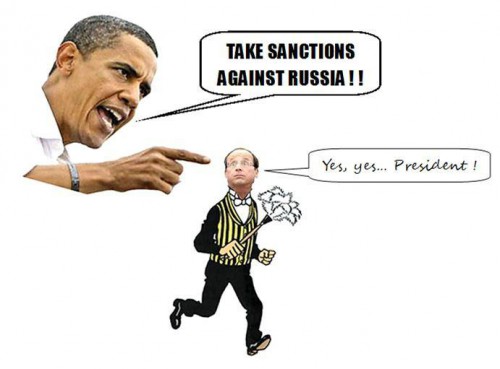

 del.icio.us
del.icio.us
 Digg
Digg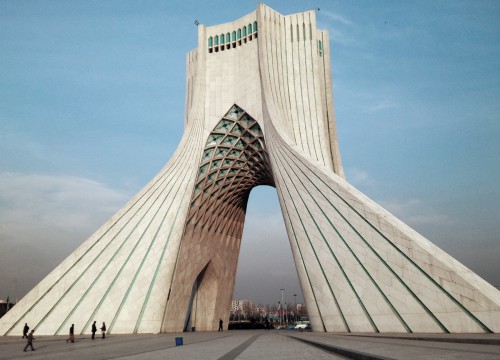


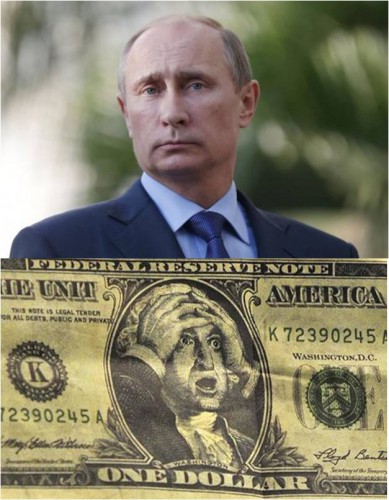


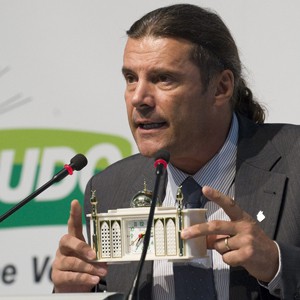


 On November 30th, voters in Switzerland will head to the polls to vote in a referendum on gold. On the ballot is a measure to prohibit the Swiss National Bank (SNB) from further gold sales, to repatriate Swiss-owned gold to Switzerland, and to mandate that gold make up at least 20 percent of the SNB’s assets. Arising from popular sentiment similar to movements in the United States, Germany, and the Netherlands, this referendum is an attempt to bring more oversight and accountability to the SNB, Switzerland’s central bank.
On November 30th, voters in Switzerland will head to the polls to vote in a referendum on gold. On the ballot is a measure to prohibit the Swiss National Bank (SNB) from further gold sales, to repatriate Swiss-owned gold to Switzerland, and to mandate that gold make up at least 20 percent of the SNB’s assets. Arising from popular sentiment similar to movements in the United States, Germany, and the Netherlands, this referendum is an attempt to bring more oversight and accountability to the SNB, Switzerland’s central bank. The US has used its court system to extort money from Switzerland, fining the US subsidiaries of Swiss banks for allegedly sheltering US taxpayers and allowing them to keep their accounts and earnings hidden from US tax authorities. EU countries such as Germany have even gone so far as to purchase account information stolen from Swiss banks by unscrupulous bank employees. And with the recent implementation of the Foreign Account Tax Compliance Act (FATCA), Swiss banks will now be forced to divulge to the IRS all the information they have about customers liable to pay US taxes.
The US has used its court system to extort money from Switzerland, fining the US subsidiaries of Swiss banks for allegedly sheltering US taxpayers and allowing them to keep their accounts and earnings hidden from US tax authorities. EU countries such as Germany have even gone so far as to purchase account information stolen from Swiss banks by unscrupulous bank employees. And with the recent implementation of the Foreign Account Tax Compliance Act (FATCA), Swiss banks will now be forced to divulge to the IRS all the information they have about customers liable to pay US taxes. Il y a plus de 50 ans, le 15 juillet 1963, Egon Bahr, à cette époque le maître à penser de la politique extérieure du SPD allemand, a fait un discours dans la Evangelische Akademie à Tutzing en Bavière, un discours d’une grande importance s’inscrivant dans l’Histoire. Il était intitulé «Wandel durch Annäherung» (le changement par le rapprochement mutuel). Egon Bahr a prononcé ce discours juste deux ans après la construction du mur entourant Berlin de l’Est (depuis le 13 août 1961 et moins d’un an après la crise de Cuba en octobre 1962).
Il y a plus de 50 ans, le 15 juillet 1963, Egon Bahr, à cette époque le maître à penser de la politique extérieure du SPD allemand, a fait un discours dans la Evangelische Akademie à Tutzing en Bavière, un discours d’une grande importance s’inscrivant dans l’Histoire. Il était intitulé «Wandel durch Annäherung» (le changement par le rapprochement mutuel). Egon Bahr a prononcé ce discours juste deux ans après la construction du mur entourant Berlin de l’Est (depuis le 13 août 1961 et moins d’un an après la crise de Cuba en octobre 1962).

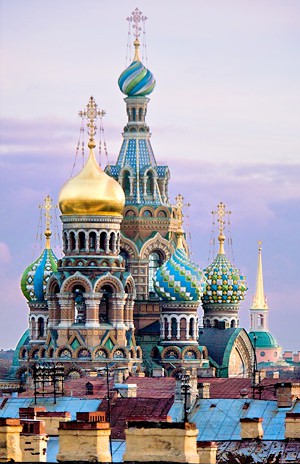 Cette nation qui a donné Pouchkine et Guerre et Paix, Nijinsky et le Lac des Cygnes, qui a l'une des plus riches traditions picturales au monde, qui a classé les éléments de la nature, qui fut la première à envoyer un homme dans l'espace (et la dernière à ce jour), qui a produit des pelletées de génies du cinéma, de la poésie, de l'architecture, de la théologie, des sciences, qui a vaincu Napoléon et Hitler, qui édite les meilleurs manuels — et de loin — de physique, de mathématiques et de chimie, qui a su trouver un modus vivendi séculaire et pacifique, sur fond de respect et de compréhension mutuelle, avec ses Tatars et ses indénombrables musulmans, khazars, bouddhistes, Tchouktches, Bouriates et Toungouzes, qui a bâti la plus longue voie de chemin de fer au monde et l'utilise encore (à la différence des USA où les rails légendaires finissent en rouille), qui a minutieusement exploré et cartographié les terres, usages, ethnies et langues de l'espace eurasien, qui construit des avions de combat redoutables et des sous-marins géants, qui a reconstitué une classe moyenne en moins de quinze ans après la tiers-mondisation gorbatcho-eltsinienne, cette immense nation, donc, qui gouverne le sixième des terres émergées, est soudain traitée, du jour au lendemain, comme un ramassis de brutes qu'il s'agit de débarrasser de leur dictateur caricatural et sanglant avant de les éduquer à servir la « vraie » civilisation !
Cette nation qui a donné Pouchkine et Guerre et Paix, Nijinsky et le Lac des Cygnes, qui a l'une des plus riches traditions picturales au monde, qui a classé les éléments de la nature, qui fut la première à envoyer un homme dans l'espace (et la dernière à ce jour), qui a produit des pelletées de génies du cinéma, de la poésie, de l'architecture, de la théologie, des sciences, qui a vaincu Napoléon et Hitler, qui édite les meilleurs manuels — et de loin — de physique, de mathématiques et de chimie, qui a su trouver un modus vivendi séculaire et pacifique, sur fond de respect et de compréhension mutuelle, avec ses Tatars et ses indénombrables musulmans, khazars, bouddhistes, Tchouktches, Bouriates et Toungouzes, qui a bâti la plus longue voie de chemin de fer au monde et l'utilise encore (à la différence des USA où les rails légendaires finissent en rouille), qui a minutieusement exploré et cartographié les terres, usages, ethnies et langues de l'espace eurasien, qui construit des avions de combat redoutables et des sous-marins géants, qui a reconstitué une classe moyenne en moins de quinze ans après la tiers-mondisation gorbatcho-eltsinienne, cette immense nation, donc, qui gouverne le sixième des terres émergées, est soudain traitée, du jour au lendemain, comme un ramassis de brutes qu'il s'agit de débarrasser de leur dictateur caricatural et sanglant avant de les éduquer à servir la « vraie » civilisation !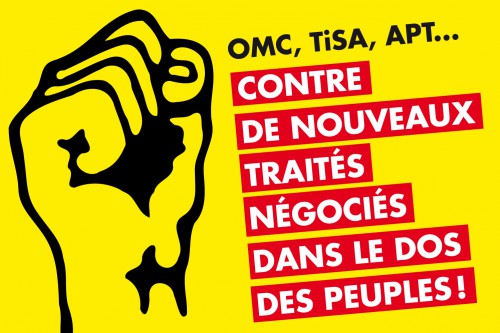
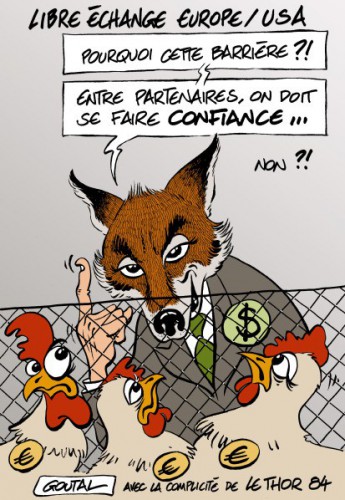




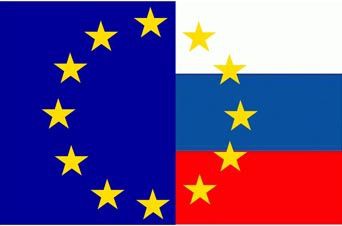 J’ai volontairement repris, dans le titre, la façon de s’exprimer de la plupart des journalistes et des dirigeants de l’UE et de l’OTAN, lesquels décrivent le conflit actuel comme opposant d’un côté « Kiev et les Européens » et de l’autre « Moscou ». Or rien n’est plus absurde ; la Russie fait partie de l’Europe et le conflit n’est qu’un conflit interne à l’Europe. En réalité, c’est un peu plus que cela, mais pas dans le sens que l’on croit, comme on le verra.
J’ai volontairement repris, dans le titre, la façon de s’exprimer de la plupart des journalistes et des dirigeants de l’UE et de l’OTAN, lesquels décrivent le conflit actuel comme opposant d’un côté « Kiev et les Européens » et de l’autre « Moscou ». Or rien n’est plus absurde ; la Russie fait partie de l’Europe et le conflit n’est qu’un conflit interne à l’Europe. En réalité, c’est un peu plus que cela, mais pas dans le sens que l’on croit, comme on le verra.


